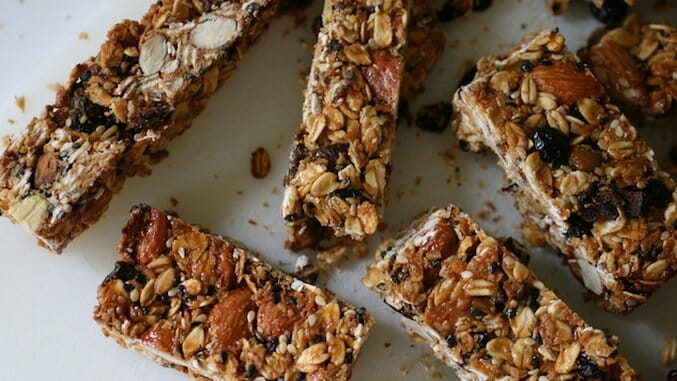Rethinking Health: Six Snacks That Are Actually Bad For You

With diabetes and obesity running rampant in the US, it’s obvious that most Americans have poor diets, high in both sugar and fat. But the thing is, many Americans think they’re eating healthy. In a survey conducted by Consumer Reports, 90 percent of Americans surveyed reported eating a healthy diet. The same survey, however, showed that respondents “rarely” or “never” ate vegetables, and most had sugary drinks like soda and alcohol on a daily basis.
It could be that Americans simply don’t know what foods are good for them—and that’s not surprising considering how food is labeled, often misleadingly, in the United States. So which foods are healthy—and which are just candy bars with great marketing? Read on.
1. Granola Bars
From Nature’s Valley to ThinkThin, granola bars are often marketed as health foods, using terminology that invokes athleticism and the great outdoors. But the truth is that most granola bars are basically cookies, high in harmful ingredients like hydrogenated oils, sugar, and MSG. Great for a treat, but not-so-great if you’re actually wanting to cut your calories.
Instead, eat: Anything high in fiber (25 grams per day is ideal for women, while men need closer to 38) and low in sugar will satisfy your sweet tooth yet leave you feeling fuller for longer. HealthWarrior Dark Chocolate Coconut Sea Salt Protein Bar, for example, has a whopping 10 grams of protein, five grams of fiber, and over 15 percent of your body’s daily allowance of iron, calcium, and magnesium, which balances out the 11 grams of sugar in every bar.
2. Trail Mix
Trail mix is another one of those foods that you think are healthy. (It’s got the word ‘trail’ in it—like you’re hiking. That’s healthy, right?) But often trail mixes are packed with sugar and carbs, thanks to ingredients like chocolate chips, pretzels, and sweetened dehydrated fruit. Nuts, which can be healthy, are usually heavily salted in trail mix in order to complement the blast of sugar—and can contain high amounts of sodium and fat. Not exactly heart healthy.
Instead, eat: Trail mixes that are loaded with nuts and seeds, which contain Omega-3s and protein. Make your own at home with sunflower seeds, non-salted peanuts, and flax.
3. Packaged Deli Meats
Men and women should eat between 46 and 56 grams of protein per day, and more if they’re physically active. But while deli meat does contain protein, it can also contain heaps of salt and preservatives, something that can lead to heart disease. Additionally, processed meats like salami and bologna have been linked to an increase in colorectal cancer, according to the World Health Organization.
Instead, eat: Deli meats that are certified organic and preferably grass-fed. (These contain less chemicals, less preservatives, and routinely have higher amounts of healthful fatty acids.
-

-

-

-

-

-

-

-

-

-

-

-

-

-

-

-

-

-

-

-

-

-

-

-

-

-

-

-

-

-

-

-

-

-

-

-

-

-

-

-








































